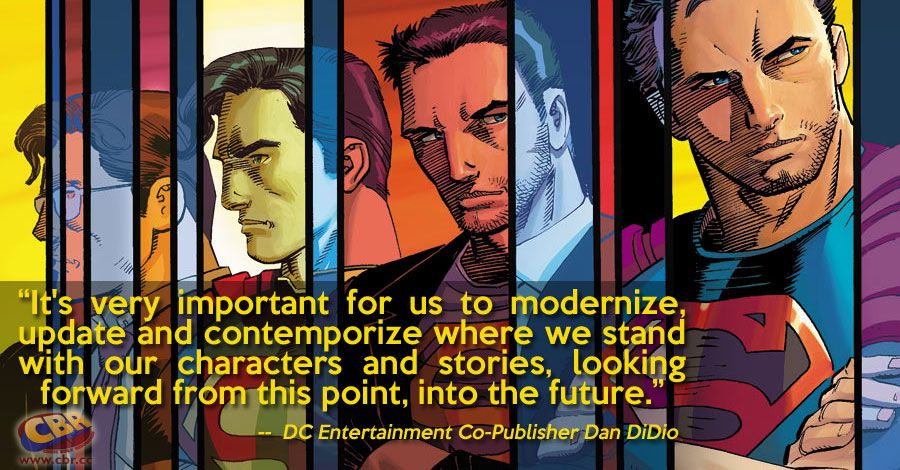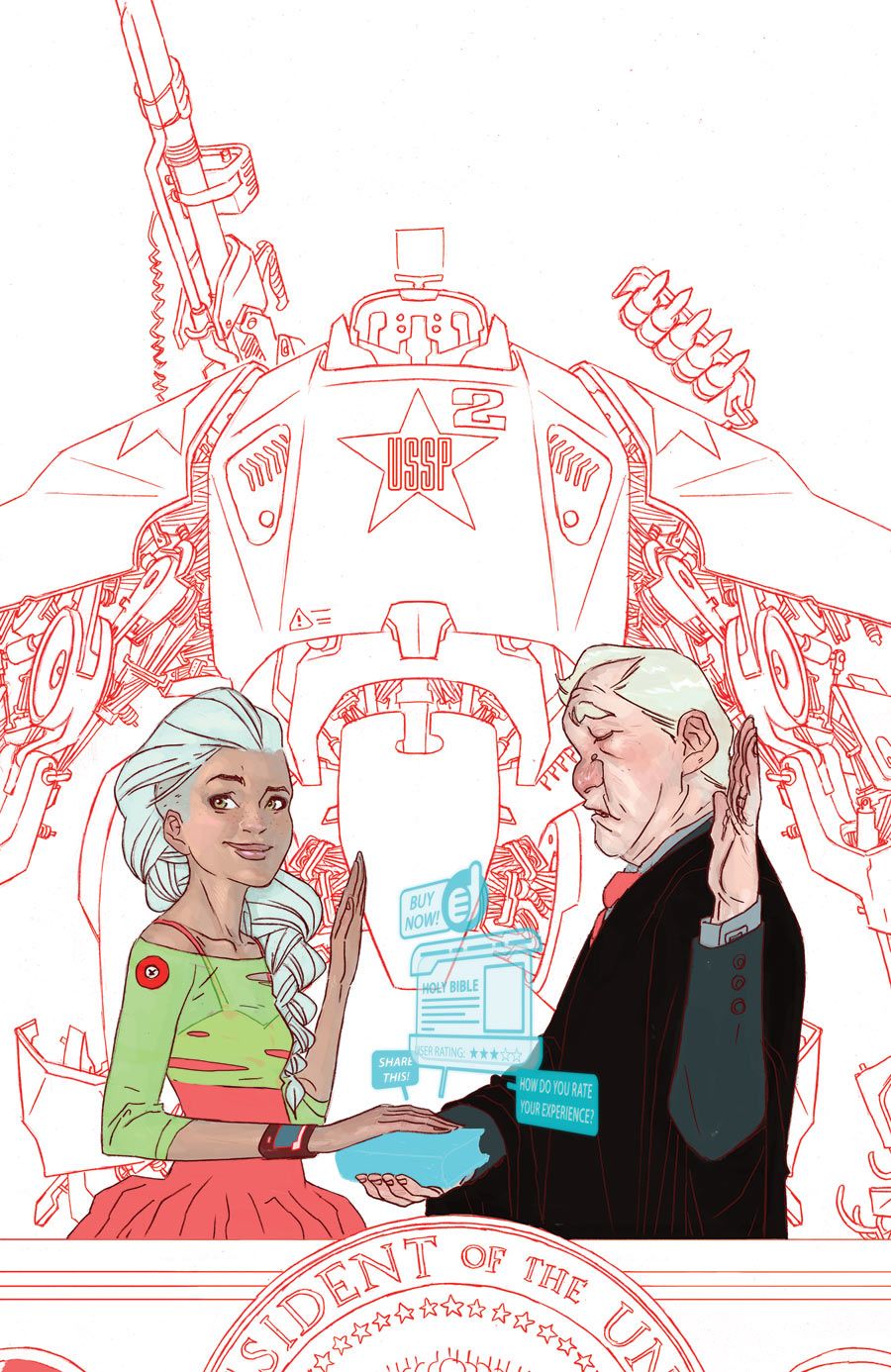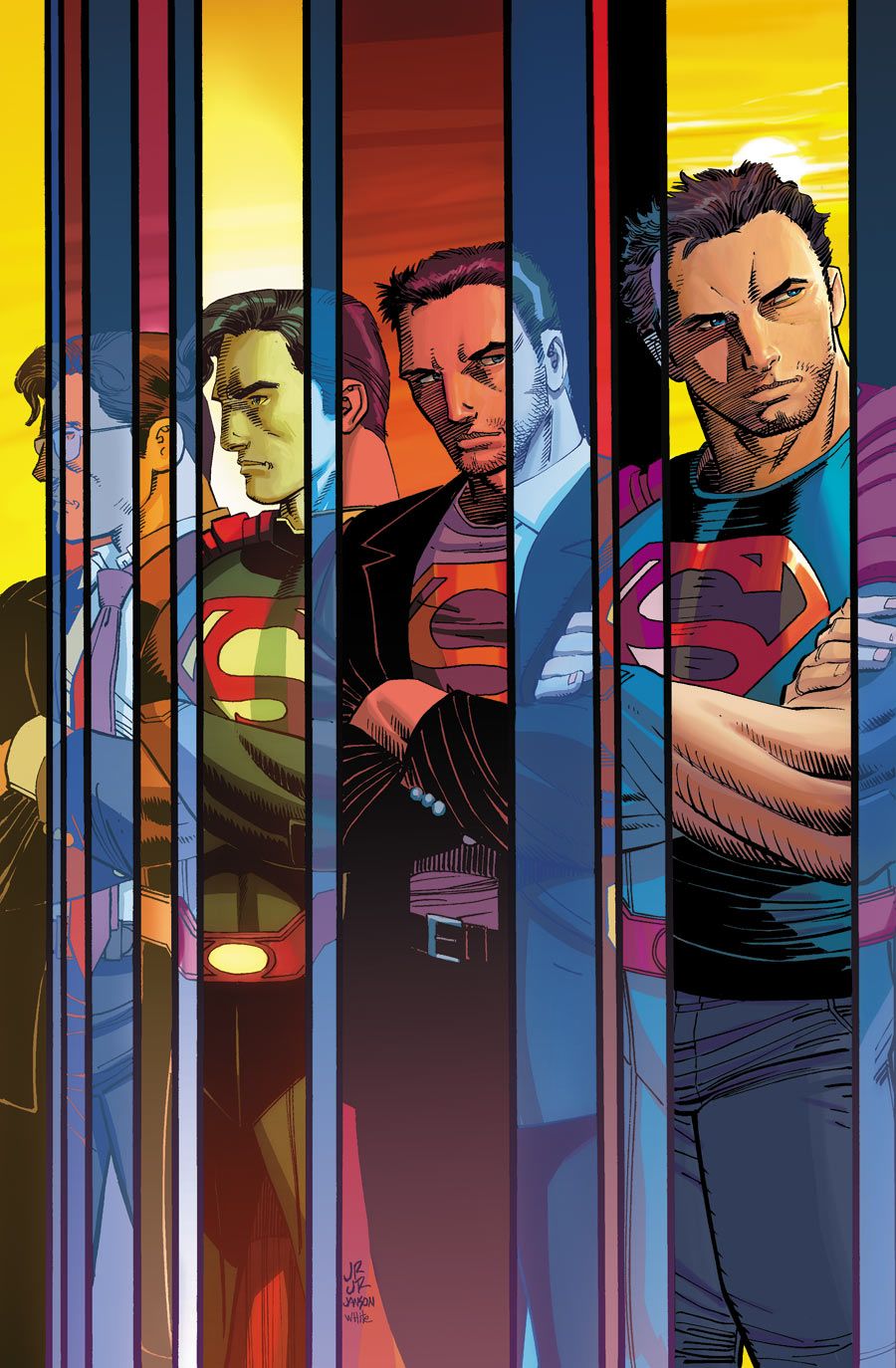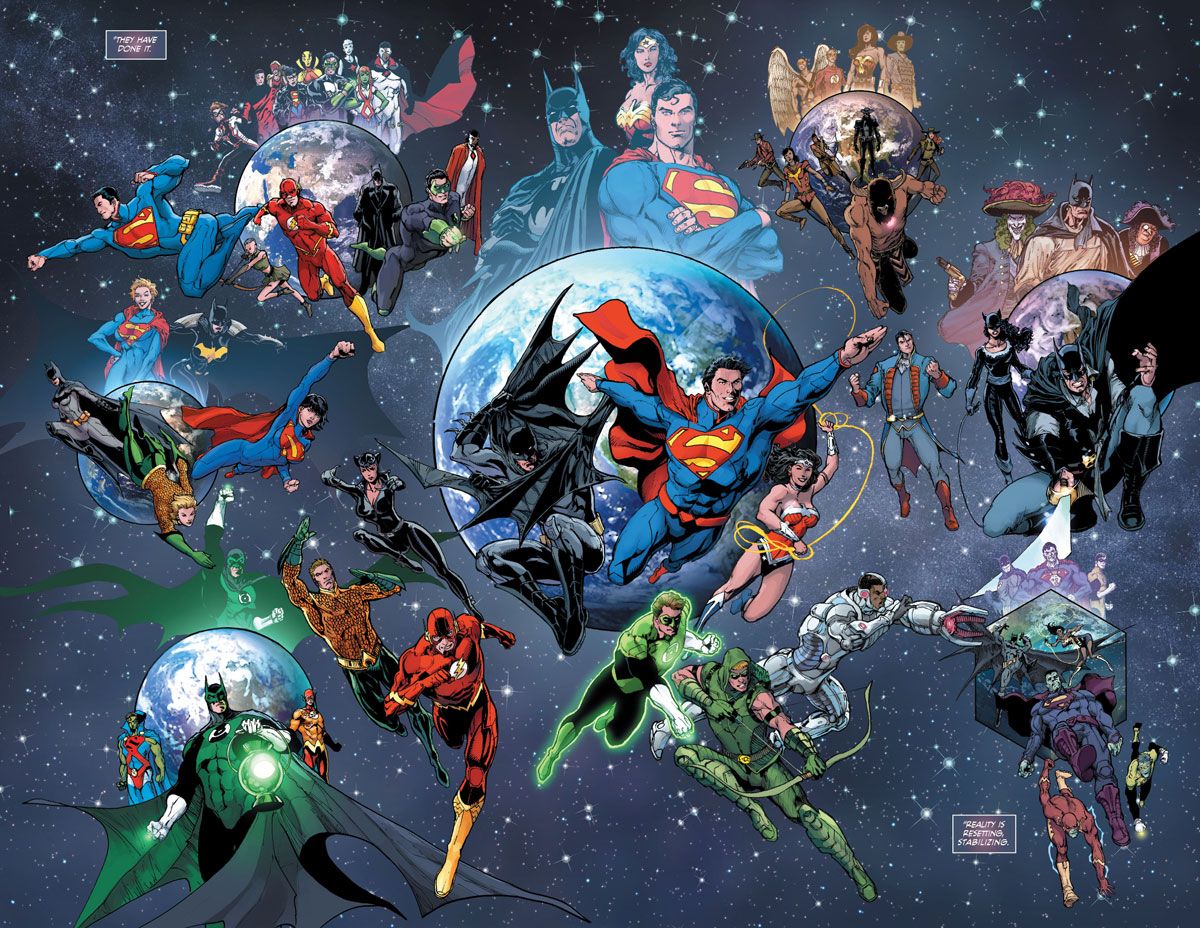June is a big month for DC Comics, featuring the debut of multiple new series and story arcs -- first announced in February and promoted under the "DC You" banner -- meant to be more inclusive and accessible to many different types of readers, highlighting diversity in tone, characters and creators. Ranging from Commissioner Gordon taking on the Batman mantle to a "Prez" revival starring a teenage girl who becomes president of the United States via a Twitter vote in 2036, the emphasis is on the new.
And that newness continues at DC behind the scenes, now firmly settled into its long-in-the-works cross-country move from its original home of New York City to Burbank, California, placing it in the same offices as the non-print publishing divisions of the company that were already West Coast-based. Interestingly enough, this comes after the two-month "Convergence" event, which ran through April and May and celebrated decades of DC history by revisiting prior versions of its iconic characters.
READ: 44 Complete Stories From the Post-"Convergence" DC Universe
All of this makes it a pretty ideal time to catch up with DC Comics Co-Publisher Dan DiDio, and CBR News did just that last week at Barnes & Noble in Los Angeles, before a public Geoff Johns Q&A moderated by the DC's co-publisher. DiDio spoke of his enthusiasm for the "new ideas and new energy" generated by DC Comics being based in just one location, and for the new creative talent that's bringing the "DC You" era to a visually distinct life. DiDio also talked "Convergence," stating that while he's happy with how the event fared -- beyond its goal as a love letter to longtime fans, it was a major sales success for the company -- he's happy to now focus on the future of DC's characters. Plus, he discusses the ending of the event, and how it may not have been exactly what it seemed.
CBR News: Dan, now that the big move from New York City to Burbank must be somewhat settled in, after a year and a half in the making, with all of DC under one roof -- has it been the positive the company was hoping for?
Dan DiDio: It couldn't have gone better, on every level. On the sheer move side, it worked extraordinarily well. We saw no interruption in our product or line; we were able to keep that all going and keep our presence on the stands, without being disruptive to anything. That's probably the most important thing -- because if you're outside, that's all you really care about: Whether or not you've got your books.
For the people on the inside, we have this really interesting mix of people that relocated from New York, people who were based here in Los Angeles, and new hires. It's almost in equal portions. Because of that, you have a wonderful mix of understanding what the company was, new people coming in who were learning, and people just coming in fresh. You get a real sense of ideas and a sense of energy. From my standpoint, I don't think it could have gone any smoother than it has.
With a new location, new hires and the debut of a couple dozen new comics all hitting around the same time -- how much does this feel, to you, like a distinct new era of DC?
A lot of that's purposely arranged. We knew going in that we had to make some changes in how we had to do business. Literally, we're changing the editorial staff -- which means relationship changes, and a lot of other things changing in regards to direction, and how we produce our books. A lot of the folks still came with us, [but] we lost a lot of good people along the way, I'm sorry to say.
We've got a lot of new folks here with new ideas and new energy. If you look at our characters, they have decades of history. The fact that we change around them is what keeps them fresh -- a new set of ideas with a new set of eyes that are really helping implement them, and push them to hopefully new heights.
It's a conspicuous time to be talking, because the first week of the slate of new "DC You" books was just released. That generated a lot of interest when first announced, including from people who may not have been previously as excited about DC's recent output. The reaction thus far seems largely positive -- how pleased are you with how the launch has gone thus far?
The initial orders and sales are exceeding our expectations, so that's always a good place to start. For me, I'm really intrigued about the way it's going to develop. The story isn't told in the first week, or the first month. The story's told over the first few months, to see what takes hold, what type of directions people are really gravitating towards, what types of stories, what types of looks. We're going to be monitoring this very closely. Ultimately, when we see things taking root and blossoming, we want to create more product to build around the talent, or those characters.
One of the most notable things about the current direction of DC Comics is seeing new and unexpected talent on books, starting with Gene Yang on "Superman." How important is that aspect to you, bringing in new-to-DC talent?
I think it's essential. We have a finite amount of product, so it's always tough when you're bringing in new talent, because it means that someone's coming off a book that might have been there for a while. But the goal is always to improve, to change, to revise, to freshen.
Gene Yang is somebody that I was extraordinarily happy to bring in. We tried to get him here years ago. For him to cover over and to come in on a flagship character like Superman is pretty exciting. Geoff [Johns] is a tough act to follow. Rather than trying to do what he did, we had somebody come in with a different perspective and point of view. Gene and John Romita Jr. hit it off wonderfully, right from the start, and there's a real sense of camaraderie that they're working with. It feels like they've been working together for years. I love watching those pages coming in, and hearing what they're planning with the character. Superman's probably one of our toughest characters to do, and they're coming at it with a sense of vigor that I think is refreshing.
It was surprising to see how many new series DC announced all at once back in February, and presumably, it doesn't stop there. So is DC continuing to look for new talent, and develop new ideas?
Yeah. We're heading into San Diego right now, so we're always going to be seeing who's coming available, who wants to participate. Now that people are seeing what we're doing and the types of stories we're trying to sell, it's interesting to see what talent we attract because of that. We will be really aggressively trying to bring to new talent to DC, and we have a lot of product that we're building -- not to replace anything immediately -- but things that we can have in our pipeline to roll out as things come to an end, and have new series come to place.
We're also working on product that will come out of "Convergence." "Convergence" was a surprise hit for us. There's a lot of excitement for it, a lot of energy to it, it's something that was built for a purpose. It was never to be something that was to be discounted. What was great about the team involved, they kept on elevating the material and finding ways to make it matter. We're going to be seeing things that seem to naturally come off of that series pretty soon.
As the marketing focuses on, the current DC lineup is intended to appeal to a wider range of audience than DC has in the past few years. Just from early reactions, it seems to have caught the attention of people who weren't DC fans, or maybe were, but dropped off somewhere along the way. For you, as someone who has worked at DC at a high level for more than a decade, how gratifying is that part?
It's keeping ourselves fresh. On a very personal level, it's interesting to be involved and watch the characters constantly reinterpreted. I think what you're seeing is a real interesting visual interpretation of the characters that's going on -- not just story-wise. I think that's what's intriguing to me. A lot of times, you can change the direction of a character, but you still had a look that matched much of what came before. Here, you're seeing some really dramatic divergences in styles and overall look of characters and art, that I think is intriguing. Because it's clear the audience is changing, and we need to change along with it. What appeals to me might not appeal to a new fan coming in. The goal is to try to attract as many people as possible, and build from where we think our greatest strengths are.
You described "Convergence" as a surprise hit -- was there worry internally that it might not be as big as it was, or that readers would disregard it as something that could be skipped?
That's in every single project we do. [Laughs] From lenticular covers to zero issues, to the launch of The New 52, there's always that moment of anxiousness and anticipation right before the launch that makes you wonder, "Is this a good idea or not?"
In this particular case, with "Convergence," I was hoping to appeal to so many of our fans. We called it a little bit of a love letter to our fanbase, and hopefully it came across in that fashion. Hopefully people got a chance to see characters and interpretations they remember, in ways they felt represented them properly, in stories they feel brought a nice sense of closure; or a sense of exposure to those characters themselves. My fingers are crossed that everybody felt it was a full and rewarding event, and hopefully they have a sense of excitement for DC again from that.
It also embraces the sense that DC has changed over the years. That's what it's saying. The fact that we're changing now, again, is just an extension of what we've always done -- so hopefully, with that level of understanding, they'll be able to jump on board and look at the new directions for the characters, and get excited about them now, as they did when they first read them in previous interpretations.
The end of "Convergence," continuity-wise, established that all of this stuff is kind of still out there.
Is that how you interpret it?
It's how it's been interpreted.
That's how it's been interpreted, you're absolutely right. [Laughs]
Do you disagree with that interpretation?
I think what's fun is the conversation that it creates at this moment between the fans. As a longtime fan before joining DC, nobody was ever out there explaining the comic stories to me. We went out and tried to figure it out. I think what you'll see in the future are stories that will help bring some level of clarity to that. But from where we stand right now, I love the conversation. I love the excitement of people trying to figure it out, and make sense of what they see in front of them, and what it might be, or might not be, at the end of the day.
Since "Convergence" was such a big hit, and people were happy to see these earlier versions of characters -- is there at least a possibility that they could be revisited somewhere down the line?
I always feel that we should always be looking forward. I feel very strongly about that. I think we have to be looking to the future. Instead of looking to the past of what we've done, I think we've got to embrace where we're heading, and what things might be coming in the future of our books and characters. Not to discount anything, but realistically, I'm more excited about where we can go than where we've been. This was a great chance to see everybody, but I think after a while, you want to start seeing where we can be going to, and what can be new and fresh.
It's clear when you see what's happening, not just with DC but the other companies -- new ideas, new directions. As long as they're true to the interpretations of the characters, and are recognizable at the core, I think it's very important for us to modernize, update and contemporize where we stand with our characters and stories, looking forward from this point, into the future.
And it's hard to do look ahead and look back at the same time.
Exactly. You'd be surprised -- ultimately, what you remember the past to be, is pure to yourself, but never captured purely when you go back there again. It's better to keep that memory clean, and really look ahead.




